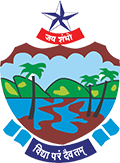BA-Program Outcomes (POs)
- PO-1:Critically and analytically read works of literature produced in many different cultures and historical periods
- PO-2:Students should be familiar with representative literary and cultural texts
BA-Program Specific Outcomes (PSOs)
- POS-1: Examine various literary techniques that writers use in constructing their texts, and demonstrate an understanding of these techniques.
- POS-2:Understanding significant cultural and societal issues presented in literature.
Course Outcomes
- F. Y. B. A. English (Semester I)
| Course Code | Course Title | Course Outcomes | Specific Course Outcomes |
|---|---|---|---|
| UACS101 | Communication Skills in English PAPER –I | To enhance language proficiency by providing adequate exposure to reading and writing skills | To orient the learners towards the functional aspects of language |
| UAENG 101 | FYBA Optional English: ‘Introduction to Prose and Fiction- PAPER –I | To acquaint students with the characteristics of various literary genres | To write clearly, coherently and effectively about various genres of literature |
- F.Y. B. A. English (Semester II)
| Course Code | Course Title | Course Outcomes | Specific Course Outcomes |
|---|---|---|---|
| UACS201 | Communication Skills in English PAPER –II | To improve listening, speaking, writing skills of the students | Understand the process of communication and its effect on giving and receiving information |
| UAENG 201 | FYBA Optional English: ‘Introduction to Prose and Fiction - PAPER –II | To recognize the culture and context of the work of literature | To develop sensitivity to nature and fellow human beings |
Course Outcomes
- S. Y. B. A. English (Semester III)
| Course Code | Course Title | Course Outcomes | Specific Course Outcomes |
|---|---|---|---|
| UABC301 | Business Communication | To develop an awareness about the complexity of communication in a dynamic business environment | To demonstrate the effective use of communication technology. |
| UAENG301 | Indian Literature in English Paper II | To introduce learners to the uniqueness of Indian Literature in English | To acquaint learners to the pluralistic dimensions of Indian Literature in English |
| UAENG302 | American Literature, Paper III | To acquaint the learners of literature with the various genres and literary terms of twentieth century American Literature | To sensitize them to the themes and styles of American Literature |
- S. Y. B. A.English (Semester IV)
| Course Code | Course Title | Course Outcomes | Specific Course Outcomes |
|---|---|---|---|
| UABC401 | Business Communication | To develop effective oral, writing and listening skills among learners. | After successful completion of the course, the learner should have enhanced Listening, Speaking, Reading and Writing skills and should be prepared to meet the challenges of Communication in the business world |
| UAENG401 | Indian Literature in | To help them understand the different genres of | To familiarise learners with different perspectives of approaching this literature |
| Indian Literature in English Paper II | Indian Literature in English | approaching this literature | |
| UAENG402 | American Literature, Paper III | To introduce them to the socio-cultural milieu of twentieth century America through literary texts | To facilitate cross-cultural perspectives and discussions on American Literature |
Course Outcomes
- T.Y. B. A. English (Semester V)
| Course Code | Course Title | Course Outcomes | Specific Course Outcomes |
|---|---|---|---|
| UAENG501 | 16th to 18th Century English Literature | To introduce students to English Literature of the 16th, 17th and 18thcenturies | To understand the distinctive features of English literature of the 16th, 17th and 18th centuries |
| UAENG502 | Literary Criticism | To use some important critical terms | To become aware the nature and function of literature and criticism |
| UAENG503A | Grammar and Art of writing | Gain a basic understanding of phonetics, morphology and word transformation | Have improved speaking skills |
| UAENG504 | 19th Century English Literature | To view literary works in their dynamic interface with the background | To understand the literature of the 19th century. |
| UAENG504 | 20th Century British Literature | To expose students to literary genres, trends, and literary movements of Britain in the 20th Century. | Students will be equipped with comprehensive understanding of literary genres trends and movements in 20th Century British Literature |
| UAENG506B | Drama and Theatre | Analyse the social and artistic movements that have shaped theatre and drama. | Apply discipline-specific skills to the creation of drama. |
- T.Y. B. A. English (Semester VI)
| Course Code | Course Title | Course Outcomes | Specific Course Outcomes |
|---|---|---|---|
| UAENG601 | 16th to | To show them how | To comprehend how |
| 18th Century English Literature | background influences shaped the writer’s thinking. | background influences shaped the writer’s thinking | |
| UAENG602 | Literary Criticism | To impart the technique of close reading of literary texts | To understand the various literary theories and critical approaches |
| UAENG603A | Grammar and Art of writing | Have developed adequate knowledge of the rules of grammar, grammatical analysis and sentence transformation | Write effectively in various domains. |
| UAENG604 | 19th Century English Literature | To appreciate poetry as mirroring private personality, protest and subsequently, public concerns | To view the development of the Victorian Novel . |
| UAENG605 | 20th Century British Literature | To enable students to create linkages between social and historical contexts and literary | To train students to develop skills for a critical and analytical |
| texts . | understanding of the text. | ||
| UAENG606B | Drama and Theatre | Analyze the difference between the concepts of drama and theatre. | Demonstrate knowledge of the history of drama and theatre as a literature and performing art. |
